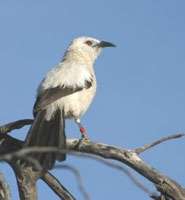Rare example of co-operative behaviour in Nature

Soldiers on sentry duty in hostile territory keep in regular radio contact with their colleagues to assure them that all is well and that they are safe to carry on their manoeuvres.
New research published in Current Biology today reveals that this is also a feature of the bird world. Natural selection suggests that individuals should act selfishly, so this is a rare example of co-operative behaviour in the animal world.
Dr Andy Radford from the University of Bristol, demonstrates how a look-out sentry for a group of foraging birds (pied babblers) informs the group of its presence by calling out a distinctive 'watchman's song'.
Commenting on his findings, Dr Radford said: "The unselfish behaviour of the sentry was rewarded further down the line by the improved survival of individuals, which in turn leads to a larger group size. This increases the sentinel's chances of survival when the group is under attack or having to repel rivals from the territory. These exciting results are a great example of true cooperation. It's a win-win scenario!"
These calls allow the group to continue foraging without having to look up and check for the presence of a sentry, thereby increasing foraging time and improving the group's survival rate.
Radford also found that when a sentry was present the group spent less time looking out for predators, spread out more widely, and spent more time out in the open, thereby improving their chances of catching bigger and better prey.
The work to study the watchman's song was carried out by observing a bird species called the pied babbler, which is found in southern Africa. Pied babblers live in groups of, on average, 6–7 individuals and operate a sentinel system while they forage for prey, such as scorpions and small snakes found beneath the surface of the sand.
The study population of 12-20 groups living in the Kalahari desert was habituated five years ago to the presence of humans, so that the birds fly in to the researchers in response to a whistle and weigh themselves on a small set of scales. Observers can then walk within a few feet of the birds to observe their behaviour and monitor the prey that they catch.
The new research, funded by the BBSRC, shows that the foragers respond to the watchman’s song alone, whether or not they see a sentinel sitting in a tree. In response to playbacks of recordings of the call, the foraging individuals spent less time looking out for predators, looked up less often, spread out more widely, and spent more time out in the open. This means that they have more time for foraging, are less likely to lose track of prey, have more foraging patches to choose from and are less likely to encounter patches that have already been depleted. As a consequence of these changes in behaviour, foragers had greater foraging success.
Dr Radford said: “Decision making in response to vocal cues is an important behaviour in social birds, and by studying it we can discover much about the way that different groups of animals develop language use. We are now investigating whether sentinels differ in their reliability and how this might influence the behaviour of their group-mates.”
Source: University of Bristol
















